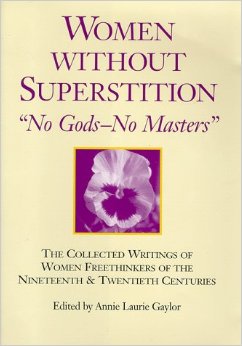
WOMEN WITHOUT SUPERSTITION: NO GODS, NO MASTERS
The free thought community has long been in need of a book detailing the enormous contributions made to our cause by women. Happily, Annie Laurie Gaylor of the Freedom From Religion Foundation has filled this gap with a wonderfully thought-provoking, well-written text. Women Without Superstition focuses primarily on American women of the last two centuries, from Mary Wollstonecraft to Taslima Nasrin. Gaylor has assembled the writings and speeches of 51 of these women and arranged them chronologically.
There truly is an abundance of riches between these covers. In addition to such well-known figures as Susan B. Anthony and Elizabeth Cady Stanton, many interesting lesser-known women are also included.
Anne Royall (1769-1854) was an extraordinary woman and an ardent defender of the Constitution as well as a most vociferous opponent of Christian influences in the political arena. Gaylor tells us: “Hating the proliferation of religious tracts and societies, Anne dumped tracts off steamboats, tore them to pieces and flung them out of hotel rooms, and drove out missionaries from the halls of Congress, wielding an old green cotton umbrella.” Royall strikes one as a free thought version of Carrie Nation, serving a much better cause!
My own personal friend Queen Silver (1910-1998) is also profiled, and an excerpt from her talk on “Humanity’s Gain from Unbelief” is included. Queen, who challenged William Jennings Bryan to a debate on evolution when she was but eleven years old, stated: “If that type of mindset always had been victorious, we would still be living in a world in which the earth had four corners, was flat, was orbited by the sun, and where heaven was about three miles straight up.”
Other profiles include:
It is unfortunate that, due to copyright laws, none of the writings of Madalyn Murray O’’Hair (1919-1995) were included. The defendant in the landmark case of Murray vs. Curlett which, combined with Abington vs. Schempp, eliminated forced school prayer across the country and earned her the sobriquet of the “most hated woman in America” was, in addition to being the founder of American Atheists, also a prolific and eminently readable author. It is also regrettable that Gaylor confined herself to American women, as there are freethinking women in other countries whose stories need to be told. It is to be hoped that Gaylor or someone like her will take on this task.
Despite this, Women Without Superstition is a priceless treasure trove for freethinkers. It may be of even greater value to feminists, many of whom may be unfamiliar with the role nonbelievers have played in advancing women’s rights. Reading this book just might bring some of them over to freethought.
Categories: Book Reviews
